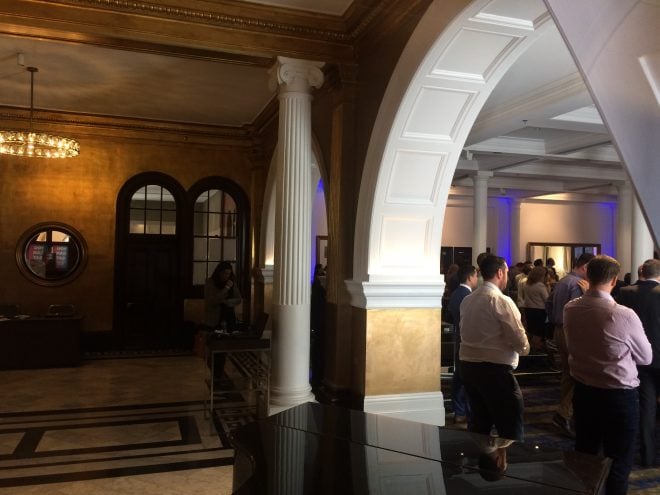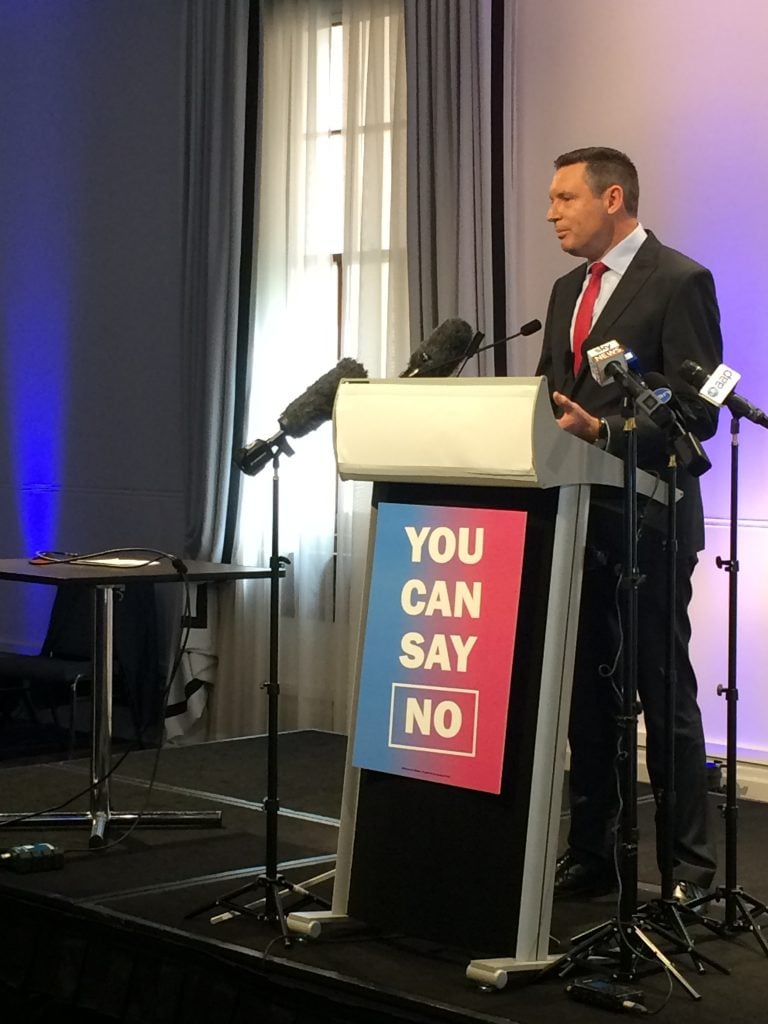Inside The No Campaign’s Sad Funeral For The Postal Survey
Somehow, after all this, they are the ones asking for time to "process their feelings".

At 10am today, the moment the postal survey results were announced, I was standing with around 15 other journalists on the back steps of the Intercontinental Hotel in Circular Quay. We were huddled around a window, on tiptoes, holding phones above our heads to try to see over a makeshift window-covering to capture what was unfolding inside: the No Campaign’s reaction to a decisive loss.
Thanks to said makeshift window-covering, there was not much to see of the reaction or the result. I first heard the Yes vote had won when a TV news reporter called the numbers down the stairs to a colleague. The rest of us stood awkwardly on the steps, glued to Twitter, checking and double-checking the numbers, and occasionally locking eyes with someone equally teary.

This was all that could be seen from the sliver of free window.
After a few minutes of awkward standing, someone else called down the steps that the Coalition for Marriage had asked for some time to process their feelings about the result; anywhere up to half an hour, we were told.
I cannot begin to explain what it was like, as a queer journo, to hear this — that at the end of several months of a campaign that felt like a constant, deeply personal attack, it was the No Campaign who needed time to process their feelings. They were the ones who wanted to close out this campaign with demands for dignity; the privacy and time to process that were utterly denied to every queer person in this country for the duration of this godawful excuse for democracy.
They eventually opened the doors around 20 minutes after the announcement, and we filed into the grand, ornate room to find it mostly empty (perhaps some left early, though I spied more than a few unclaimed name tags still on the registration desk). The media presence came close to outnumbering the event’s invitees, who clung to the fringes of the room in small groups. Despite how few of them there were, they made an almighty noise for Lyle Shelton when he took to the podium.
“Onya Lyle!!”, one person bellowed to rapturous applause and whistling, as if this event were something other than an under-attended funeral for a failed campaign.
Shelton himself looked like a man trying very hard to not look like he’d just been brutally owned. He was smiling, gracious in defeat except for the part where he tried to say the Yes campaign had a decade’s head start on campaigning, and also the part where he backed the Paterson bill as a reasonable step forward.
In his brief speech, you could see the No campaign pivoting and transforming itself in real-time. Despite congratulating the Yes campaign on a “decisive victory” and a clear win, this was not a concession speech.
“We haven’t quite got to where we wanted to go,” is how he phrased it. “But I sense that there’s a desire amongst so many of these people to continue to participate in our great democracy.”
“The democracy hasn’t gone our way today, but I thank god that we live in a free and open and democratic society, and I trust those people who have been energised by this campaign will continue to participate in our democracy.”

His supporters — or at least those of them who would speak to me — felt similarly. Only one person I spoke to was ready to concede the result. The rest seemed to have already set their sights on winning as much ground as possible in the resulting legislation.
“This is a Pandora’s box we’re opening up now,” an older couple told me, after confessing that they really did think the No vote was going to win today. They were worried about religious freedoms, about Safe Schools, about “children being educated into diverse sexual activity when they’re vulnerable”. The pair told me they would spend the rest of the day running errands, but hopefully make some time to email some MPs later on.
Another group, a handful of young men in their early twenties wearing nearly indistinguishable checked shirts, echoed concerns about freedom of speech, freedom of conscience, freedom of religion, saying ‘freedom’ until it started to sound like a weird, made-up word. They said they supported the Paterson bill, but were shocked when I told them that the kinds of religious freedom it protected were illegal right now.
“So you’re saying a baker can’t refuse gay people?” one said, dumbfounded. “I thought it was just like the free market. Like, if one person doesn’t want to serve them, they go somewhere else.” When I asked the trio what they had planned for the rest of the day, one shrugged and said he’d probably go home and watch Rick and Morty.
After a few of these conversations, there was nothing else to do but leave. The room had dwindled down to a few huddles of people, some speaking to reporters, most in tight-knit circles, talking about freedom. I walked back out down the back stairs, and stood again in the spot where I first heard this country’s emphatic yes: the edge of a stairwell at the back of a grand old building I wasn’t allowed into. Fitting metaphor, really. I look forward to getting time to “process”.
–
Sam Langford is Junkee’s Staff Writer. She tweets @_slangers.


